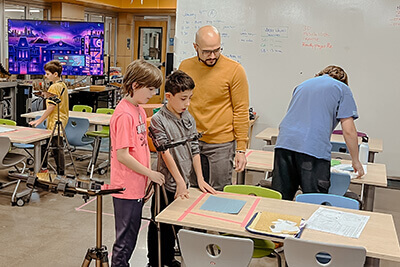January 11, 2024
 I’m not a big fan of New Year’s resolutions. I’ve made them in the past and forgotten about them within a few weeks—workout machines that soon become a place to drape clothes or a gym membership that quickly goes unused. What I’ve learned over the years is that committing to continual improvement is more sustainable and successful than a one-time set of resolutions.
I’m not a big fan of New Year’s resolutions. I’ve made them in the past and forgotten about them within a few weeks—workout machines that soon become a place to drape clothes or a gym membership that quickly goes unused. What I’ve learned over the years is that committing to continual improvement is more sustainable and successful than a one-time set of resolutions.
MPA is committed to continual improvement. The roadmap for improvement is defined in our strategic plan, 2024ward, and validated by accreditation by the Independent Schools Association of the Central States, ISACS. 2024ward resulted from multiple conversations with MPA constituents and a thorough study of what our students need to be successful now and in the future.
The first priority of 2024ward is to “empower students to live, learn, and thrive in our increasingly complex and globalized society.” How we do that is in part expressed in the second priority, “ensure an equitable and inclusive community.” To succeed, we need to “affirm and inspire our exceptional and dedicated faculty and staff,” as stated in the third priority. Finally, our school’s future will be secured by the fourth and final priority, “enhance institutional capacity by continuing to strengthen financial sustainability.” These four priorities and the goals, objectives, and action plans support and guide decisions and ongoing school improvement.
Priority One, “Empower students to live, learn, and thrive in our increasingly complex and globalized society,” can seem as though we need a crystal ball. It’s a bit daunting and pretentious to think we have a hold on the future, especially in a society and world hurdling forward at a breakneck speed. However, we know we can’t continue to live and learn the same way we have in the past. As celebrated educational reformer John Dewey said, “If we teach today as we taught yesterday, we rob our children of tomorrow.”
I spend much of my time thinking about the future of education, particularly as we’ve emerged from the pandemic and shifted from the information age to what author Daniel Pink calls the conceptual age. While the industrial age focused on results and the information age focused on data, facts, and technology, the conceptual age depends on high-touch skills like empathy and high-concept skills such as the capacity to detect patterns and opportunities or combine different or unconnected ideas together. With the advent of AI, large data sets of information are readily accessible, and computers can now analyze it. Our future depends on the ability to harness curiosity and creativity to create novel solutions to pressing challenges in our world.
Our commitment to continuous improvement occurs in every classroom, in each division, within each academic department, office, conference room, and in the board room. Every Tuesday, the workday is extended by an hour and a half so that employees have the necessary time. Committees comprised of faculty and staff work to revise and update our curriculum review process, develop school-wide standards covering technology, equity and belonging, social-emotional learning, foster employee engagement, and create a portrait of an MPA graduate. Academic departments have begun the current cycle of re-reviewing their curriculum and researching innovations and best practices in content-specific areas to make improvements.
Our overarching goal this year is to build upon the work of last year that names student outcomes—portrait of a graduate, social-emotional learning standards, equity and inclusion standards, and technology standards—to create a competency framework that can align priorities, is supported by research, and makes the portrait of a graduate actionable. This competency framework articulates and makes actionable the transferable skills MPA values and is committed to teaching. The framework includes research-based future-ready competencies that will enable MPA students to navigate the uncertainty of what lies ahead. I look forward to sharing this exciting project with you in more depth over the next several months.
I recently read somewhere that 70% of the jobs in 2030 haven’t yet been created. While there is no crystal ball, I have no doubt MPA graduates have the knowledge, skills, and attributes to “live, learn, and thrive in our increasingly complex and globalized society.”